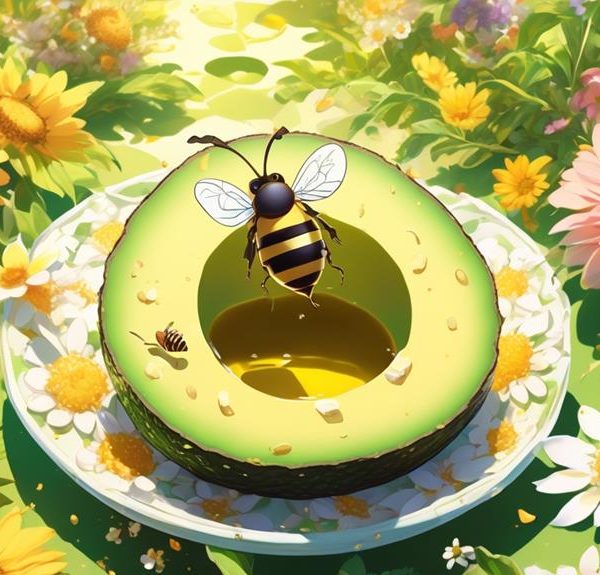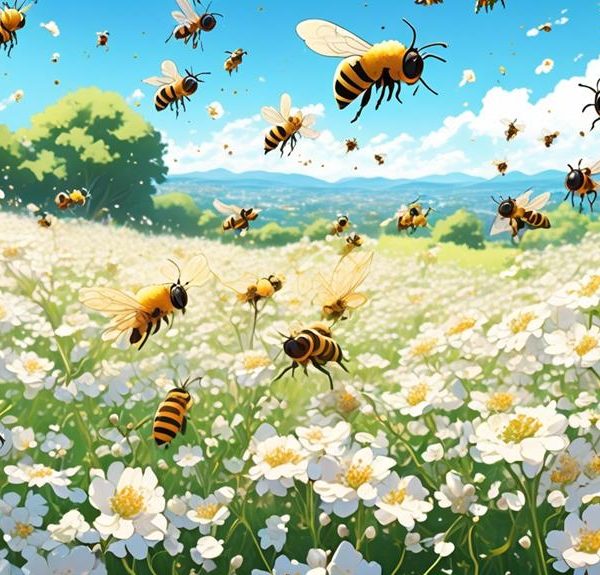Avocados and bees share a unique relationship; uncover the intricate role these buzzing creatures play in the journey of your favorite fruit.
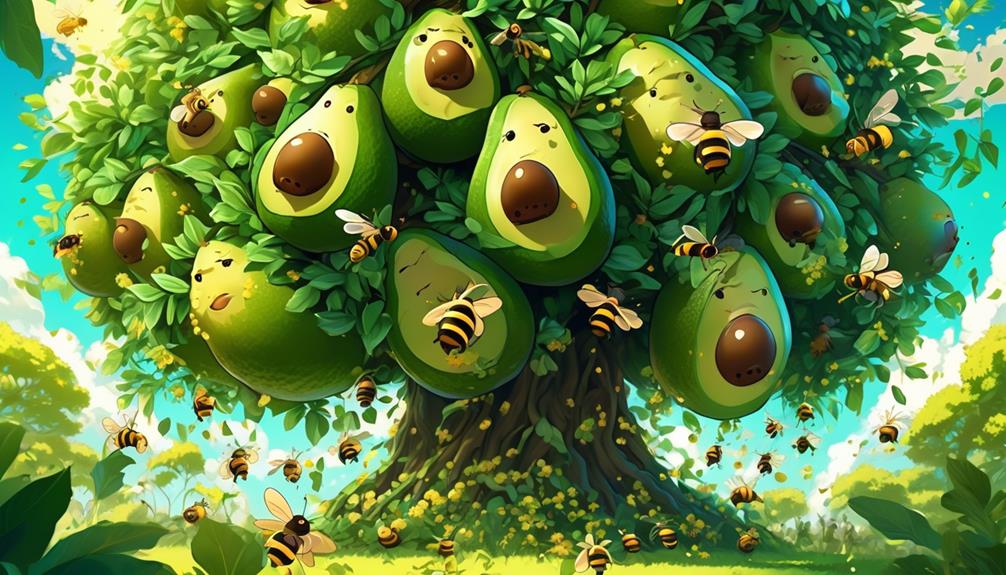
Do Bees Like Avocado Trees
Just as you're enjoying your delicious avocado toast, have you ever stopped to ponder the journey of how that avocado ended up on your plate? It's a fascinating story that involves, among other things, bees.
Yes, those tiny industrious creatures play a crucial role in the life cycle of your favorite fruit. You might be wondering, do bees actually like avocado trees? Well, the relationship between bees and avocado trees is quite an intriguing one, and there's more to it than meets the eye.
Why don't we explore this further?
Key Takeaways
- Avocado trees rely on bees for successful pollination and increased fruit yield.
- Bees are attracted to avocado trees due to their bright, nectar-rich flowers and their synchronous dichogamy flowering behavior.
- Creating a bee-friendly environment around avocado farms, such as planting diverse flowering plants and avoiding pesticide use, is crucial for attracting bees and ensuring a healthy ecosystem.
- Bee-pollinated avocados have higher oil content and more uniform shape, resulting in increased market value for avocado farmers.
Understanding Avocado Tree Pollination
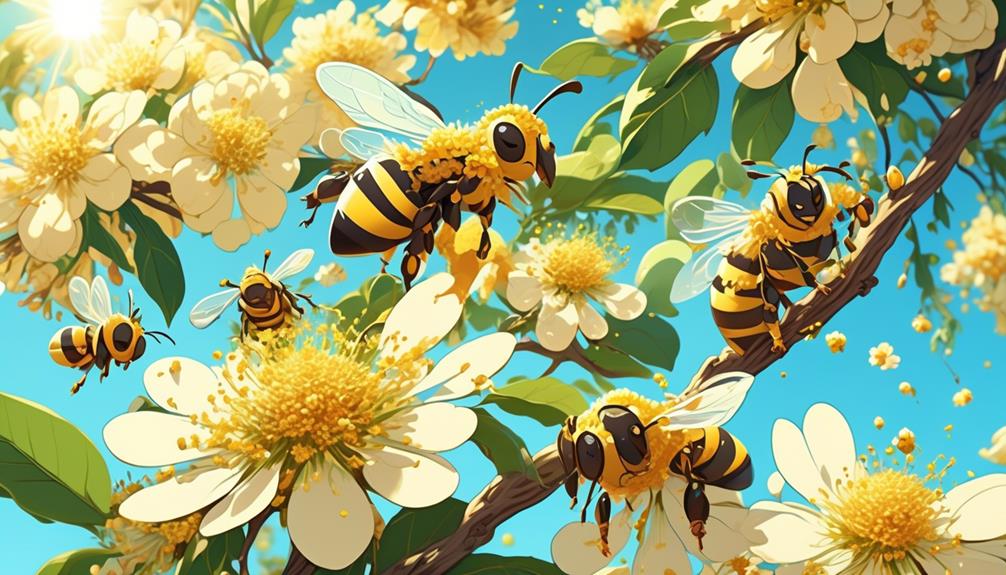
To fully grasp the process of avocado tree pollination, you'll need to understand the unique dance between the tree's blooming behavior and the activity of its pollinators, predominantly bees.
Avocado trees exhibit a peculiar flowering pattern known as 'synchronous dichogamy'. This means that each flower opens twice, but with a different gender each time, encouraging cross-pollination.
Now, let's delve deeper. The tree's flowers are classified into two types: Type A and Type B. Each type opens at a different time of the day and at distinct gender phases. Type A flowers open in the morning as female and reopen as male in the afternoon of the following day. Conversely, Type B flowers open as female in the afternoon and reopen as male the next morning. This intricate timing mechanism is designed to increase the chances of cross-pollination.
Here's where bees come into play. As bees buzz from flower to flower collecting nectar, they inadvertently transfer pollen, facilitating the cross-pollination process. The overlapping opening hours of Type A and B flowers allow bees to act as a bridge between the two, making them vital players in avocado production.
The Role of Bees in Avocado Production
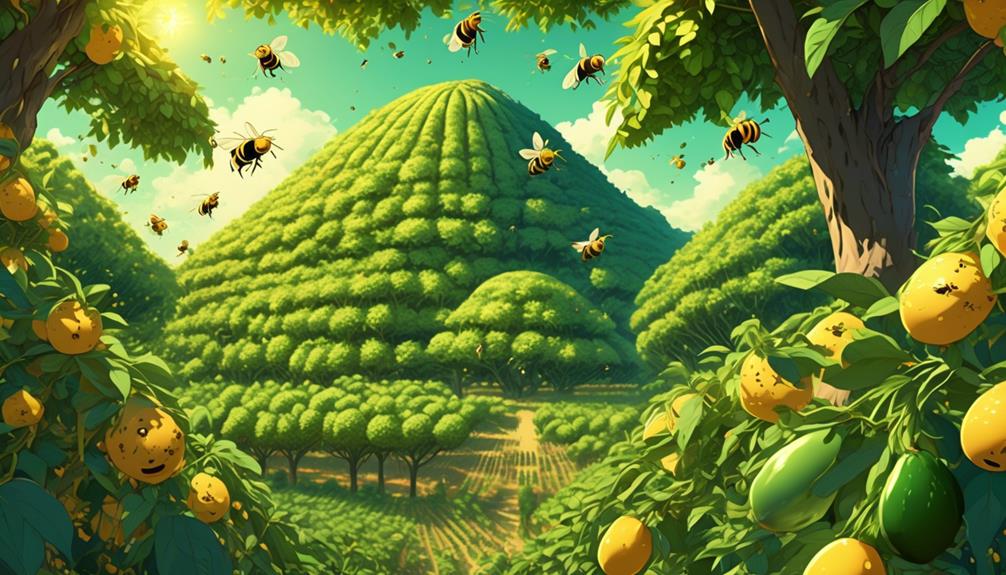
Having understood the unique pollination mechanism of avocado trees, let's now consider the indispensable role bees play in this process. Bees, particularly honeybees, are vital pollinators for many crops, including avocados. They're attracted to the trees' flowers and, as they move from flower to flower collecting nectar, they inadvertently transfer pollen, facilitating fertilization.
This process, known as cross-pollination, significantly increases the fruit yield of avocado trees. You see, avocado flowers exhibit a unique 'dioecious' flowering behavior, where flowers open as either female or male at different times. This peculiar mechanism encourages cross-pollination, thus enhancing genetic diversity and yield.
However, cross-pollination isn't a solo act. It requires the tireless work of bees. They're the ones who bridge the gap between the male and female phases, ensuring successful pollination. Without their buzzing efforts, the avocado yield would be substantially reduced. So, it's safe to say that bees and avocados share a symbiotic relationship.
The presence of bees near avocado plantations, therefore, isn't just desirable, but essential. So, do bees like avocado trees? Absolutely. And, as you can see, the feeling is mutual. Avocado trees love bees too – they're the key to their reproductive success.
Factors Attracting Bees to Avocado Trees
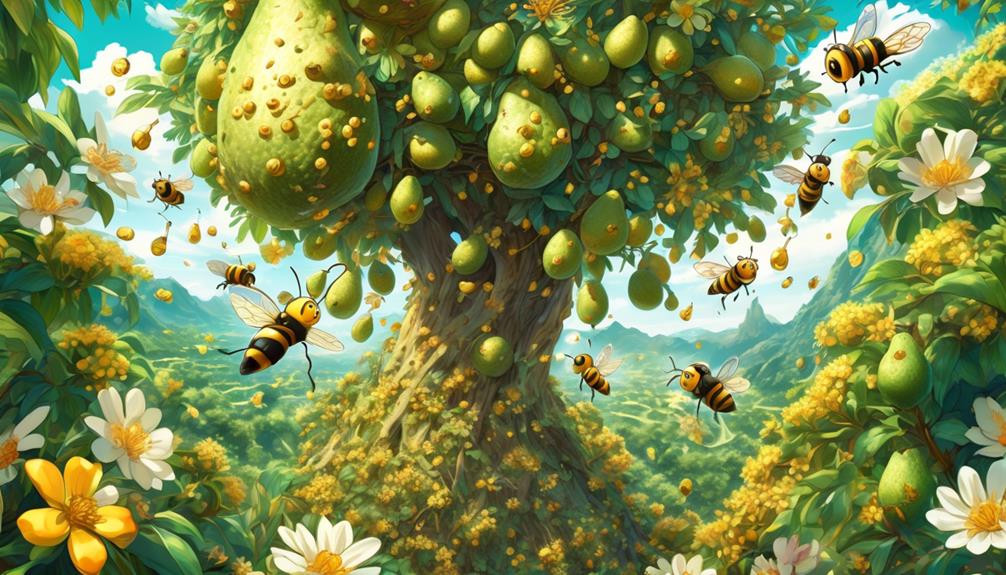
You might be wondering what exactly draws bees to avocado trees, and it's a combination of factors that make these trees particularly attractive for these industrious pollinators.
Firstly, bees are attracted to the bright, nectar-rich flowers of the avocado tree. These flowers provide ample food for bees, making them an ideal feeding ground.
Secondly, the timing of the avocado tree's bloom also plays a role. Avocado trees typically flower in the spring, a period when other food sources for bees may be scarce. Therefore, bees are attracted to these trees as they offer a reliable food source.
Thirdly, the avocado tree's unique flowering behavior, known as 'synchronous dichogamy', is also appealing to bees. This mechanism, where a single tree's flowers can be both male and female at different times, maximizes cross-pollination and thus, attracts a higher number of bees.
Lastly, the tree's height plays a role. Bees often prefer taller trees as they provide more protection from predators.
Importance of Bees for Avocado Farmers
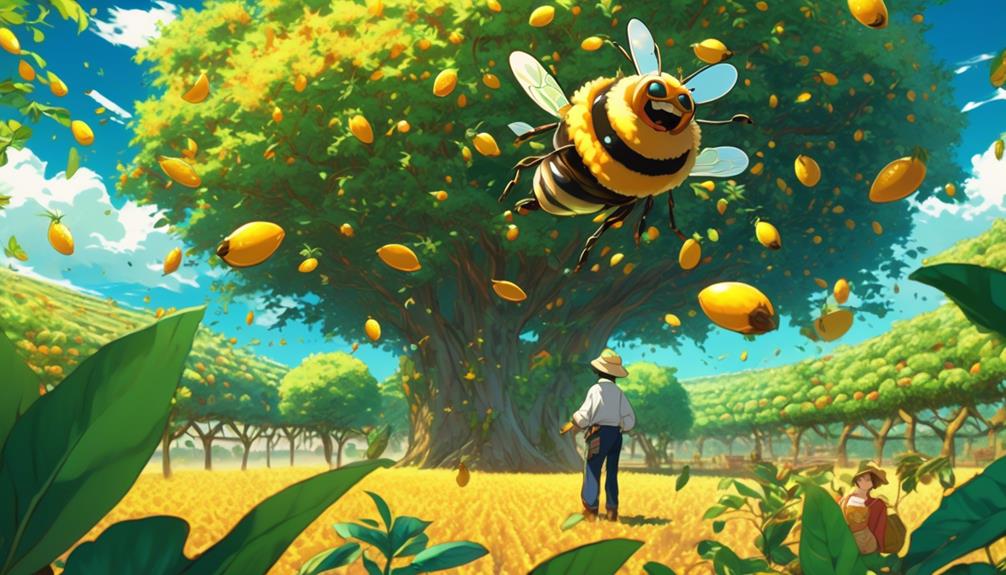
Undoubtedly, bees play a crucial role in the success of an avocado farmer's harvest, as they're the primary pollinators of avocado trees. Without these industrious insects, you wouldn't have as abundant a yield, since cross-pollination is necessary for a fruitful harvest.
Bees transfer pollen from the male flower to the female, enabling fertilization. Their buzzing wings create an electrostatic field that attracts pollen grains, enhancing the efficiency of pollination. Besides, bees' innate attraction to the avocado's nectar ensures the pollination process is continuous throughout the flowering period.
As an avocado farmer, you'd also notice that bee activity enhances the quality of your fruit. Studies show that bee-pollinated avocados have a higher oil content and are more uniform in shape. This directly translates into a better market value for your produce.
It's essential to foster a bee-friendly environment around your avocado farm. Planting diverse flowering plants and limiting pesticide use are just some ways to attract more bees. By understanding and valuing the symbiotic relationship between bees and avocados, you're not only ensuring a bountiful harvest but also contributing to the overall health of the ecosystem.
Strategies to Attract Bees for Pollination
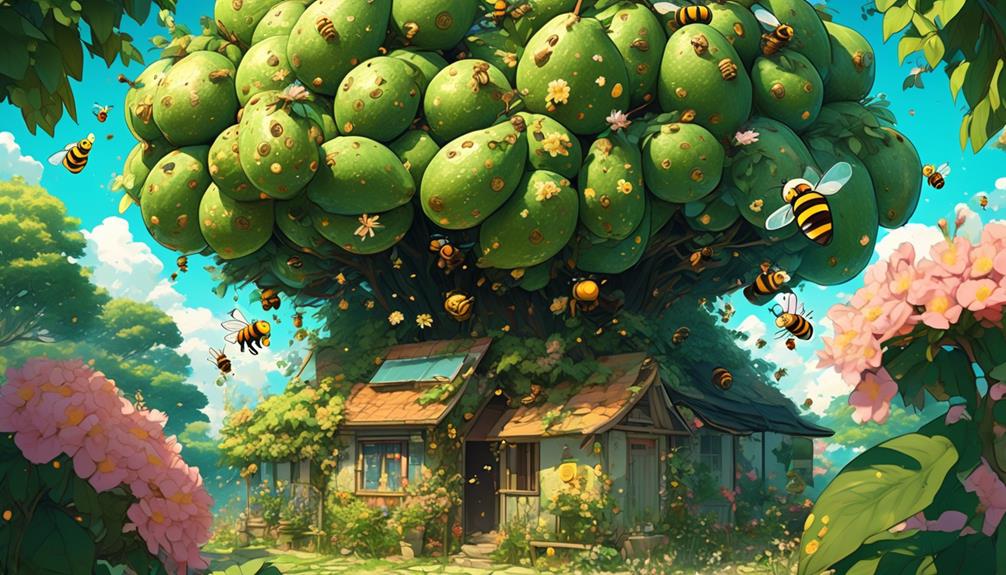
To attract more bees for pollination, it's vital to implement strategic measures that create a conducive environment for these essential pollinators. One effective approach is to plant a variety of flowering plants, not just avocado trees, in your garden or orchard. Bees are drawn to diversity, and a wide range of flowers can provide them with the necessary nectar and pollen they need throughout the year.
Another significant strategy, which is often overlooked, involves water sources. Bees, like any other living creature, need water to survive. By providing clean, shallow water sources, you'll make your garden more appealing to these industrious insects.
Avoiding the use of pesticides is also crucial. These chemicals can be deadly to bees and can disrupt their ability to pollinate effectively. If pest control is necessary, consider using natural, bee-friendly alternatives.
Lastly, consider the installation of bee houses or hives. This offers bees a safe place to live and breed, increasing their population in your area and boosting the pollination of your avocado trees.
Frequently Asked Questions
What Other Insects Can Help in the Pollination of Avocado Trees?
Besides bees, other insects can contribute to avocado tree pollination. Butterflies, moths, and beetles, for instance, can transport pollen between flowers. Certain types of flies also aid in pollination.
It's essential to remember, though, that weather, temperature, and the specific variety of avocado can influence which insects are most effective at pollinating your trees. So, you'll need to consider these factors in your garden planning.
How Can Bees Damage Avocado Trees, if They Do?
Bees don't typically damage avocado trees. They're vital pollinators, transferring pollen from male to female flowers. However, in rare cases, if a hive's located too close to a tree, bees might cause minor physical damage.
They aren't capable of harming the tree's health or fruit production. So, you don't need to worry about bees damaging your avocado trees.
They're more likely to contribute to a bountiful harvest.
What Are Some Common Diseases That Can Affect Avocado Trees and What Role, if Any, Do Bees Play in Their Spread?
Avocado trees can suffer from diseases like root rot and sunblotch. Root rot, caused by a fungus, can be spread if bees carry spores between plants.
Sunblotch, a viral disease, isn't transmitted by bees. It's worth noting bees aren't typically harmful to avocados. In fact, they're vital for pollination. So, while they can inadvertently contribute to disease spread, their overall role in avocado cultivation is highly beneficial.
What Specific Steps Can Homeowners Take to Protect Their Avocado Trees From Pests While Still Attracting Bees?
You can protect your avocado trees from pests while still attracting bees. Regularly inspect your trees for signs of disease and pest infestation.
Use organic pesticides that are safe for bees. Plant flowers that attract bees near your avocado trees to encourage pollination.
Maintain a healthy soil environment to support tree health. It's a delicate balance, but with careful planning, you can keep your trees healthy and still support the local bee population.
What Are Other Benefits of Bees to the Ecosystem Apart From Pollinating Avocado Trees?
Besides pollinating avocado trees, bees have other crucial roles in the ecosystem. They pollinate a wide variety of plants, aiding in food production.
Bees also contribute to biodiversity by assisting in the reproduction of wild plant species. Their role in the food chain is significant too, as they're a food source for many species.
Further, honey bees produce honey, which isn't only a natural sweetener but also has medicinal properties.
Conclusion
So, do bees like avocado trees? You bet they do! The nectar and pollen of avocado blossoms are major attractions. As a key player in avocado production, bees facilitate pollination, boosting crop yield.
Avocado farmers, therefore, have a vested interest in making their orchards bee-friendly. Through strategic planting and sustainable practices, they can attract more bees and enhance pollination, thus ensuring a bountiful avocado harvest.
Truly, bees are essential partners in avocado farming.

